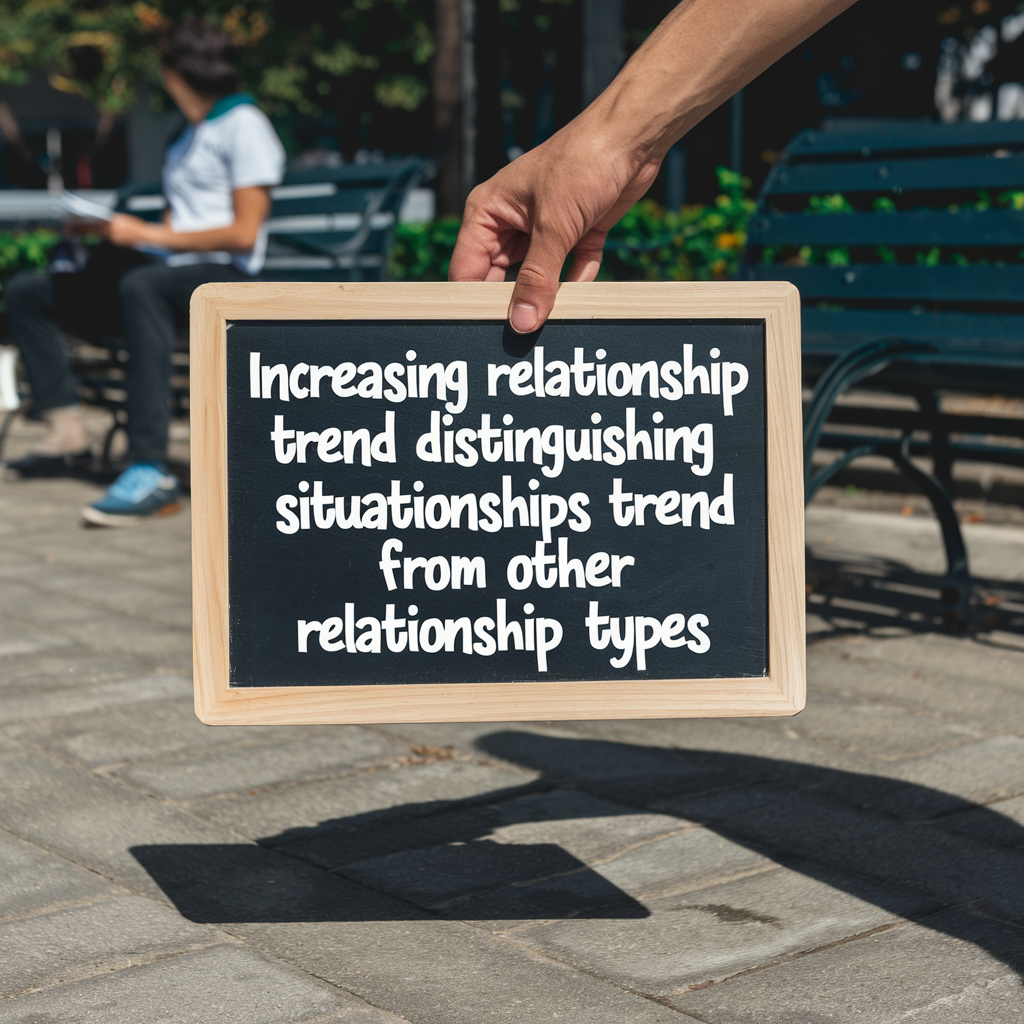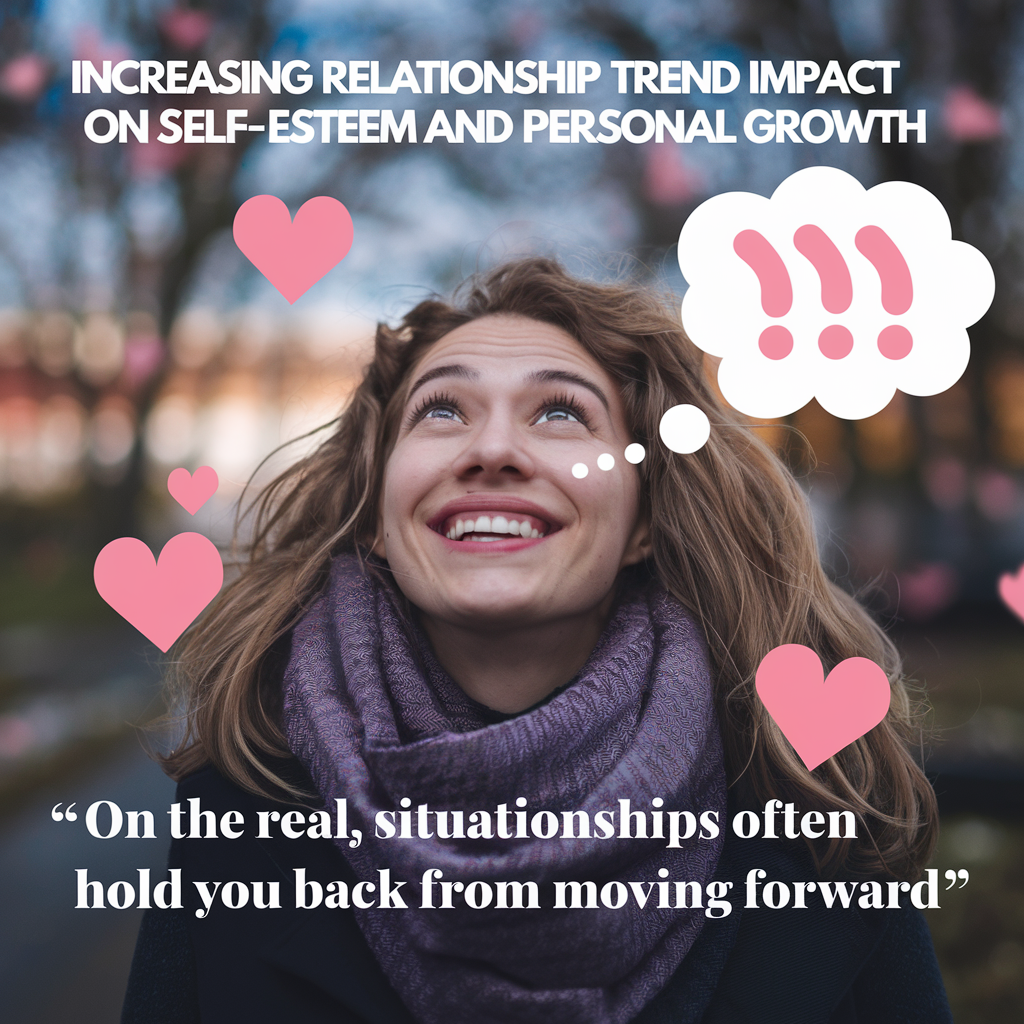Key points
Here are 3 key points that make up a situationship:
- A situationship refers to an informal or undefined romantic relationship between two people who spend time together intimately without being in a committed relationship.
- A situationship happens when both people want to be together physically or emotionally but are unsure if they want to make things official by becoming girlfriend and boyfriend.
- But without clearly defined boundaries, people in a situationship sometimes cross lines or send mixed signals about how serious they are.
Contents
- 1 Key points
- 2 Defining Situationships
- 3 Origins and Evolution of the Term
- 4 Cultural Context and Modern Dating
- 5 Distinguishing Situationships from Other Relationship Types
- 6 Characteristics of a Situationship
- 7 Ambiguity and Lack of Labels
- 8 The Psychology Behind Situationships
- 9 Communication in Situationships
- 10 Navigating Conversations About Status
- 11 Managing Expectations and Misunderstandings
- 12 Establishing Mutual Understanding
- 13 Impact of Situationships on Individuals
- 14 Emotional Rollercoaster and Mental Health
- 15 Impact on Self-Esteem and Personal Growth
- 16 Lessons Learned and Moving Forward
- 17 Frequently Asked Questions (FAQ)
Defining Situationships
Situationships are kinda tricky to pin down. It’s like, you’re spending time with someone but you’re not really dating – maybe you hook up sometimes or go on casual dates. And there’s definitely feelings there, but you haven’t had the chat about making it official, you know? So it’s in this gray area.
Origins and Evolution of the Term

Situationships are nothing new, people have probably been doing this type of thing forever. But people are saying the term started getting used more in the last few years. And it feels more common now with apps making it easy to meet lots of people. Kinda feels like folks are more hesitant to label things because everything is so fleeting. Or maybe they just want to keep their options open.
Cultural Context and Modern Dating

Dating culture has for sure changed a lot. It’s not like back in the day where you mainly met people you knew, now you can scroll through a bunch of strangers. That probably plays a part in why some folks don’t want to commit right off. Or they’re juggling multiple situationships at once! But it does make things confusing when you’re not sure where you stand with someone.
Social Media and FOMO
With social media, there’s always this sense you might be missing out if you choose one person. Like, what if your soulmate is one swipe away? That FOMO gotta be part of why people hesitate to lock it down. And once you put a label on something, you kinda miss out on other chances.
Distinguishing Situationships from Other Relationship Types

So situationships are pretty much in between being single and being in a relationship. You’re not official but you’re also more than just casual. They can blur into talking stages real easy. And it’s possible to catch feelings when you meant for it to just be casual. The lines tend to get messy which is why clear communication is important if you wanna avoid drama.
Characteristics of a Situationship

Actually, a situationship is basically when two people are involved either physically, emotionally, or both but it ain’t clear what they are to each other. There ain’t no labels on it so you’re just kinda wandering around in ambiguity together. You both might be getting something out of it, be it companionship, company or just something to keep you occupied. But it ain’t clear if you’re officially girlfriend and boyfriend.
Ambiguity and Lack of Labels

And the big issue with a situationship is that it’s real fuzzy what you both actually want. There ain’t no titles like “boyfriend” or “girlfriend” so you don’t really know where you stand. You’re just kinda there for each other sometimes but there ain’t no commitment. It can be confusing cause it feels like there’s something there but you don’t know for sure. The not knowing just adds to the ambiguity of it.
Emotional and Physical Involvement
But usually with a situationship you’re both still investing in each other emotionally, and maybe even physically. Like you go on dates and talk about personal stuff. You may even be sleeping with each other. So it’s like you’re getting close in those ways. But without defining what you are, it just makes everything hazy and you don’t really grasp where you stand with that person.
Expectations and Boundaries
And since you ain’t got clear titles or rules between you, there ain’t obvious expectations for how you should act or boundaries for what you can and can’t do. Like is it cool to see other people? How often you gonna see each other? Who makes the plans? It’s all real vague without talking about it. That just leads to mixed signals and confusion about what you’re both wanting and what the deal is with your situationship.
The Psychology Behind Situationships

Situationships develop for a reason. Actually, there’s usually some underlying emotional thing goin’ on that makes clearly defining the relationship tricky. A lotta times it comes down to unresolved commitment issues or fear of intimacy that develop over time through our experiences. Maybe we got hurt in past relationships, and it’s made us gun-shy about jumping all in with someone new. So we hover in this gray area instead, where we get companionship and independence at the same time.
Commitment Issues and Fear of Intimacy
Fear of commitment is real. It makes total sense to hold back a bit if you’ve been burned before or seen messy breakups go down. At the same time, keeping things loosely defined means you don’t have to risk really opening yourself up to someone either. The tradeoff is you don’t fully experience real intimacy and closeness either. It’s like a self-protection mechanism we develop without even realizing it sometimes.
The Appeal of Flexibility and Freedom
Nobody wants to feel trapped! So keeping things casual means you don’t have to commit all your time and energy to one person. You can keep your options open and come and go as you please without worrying about anyone else or checking in. The downside is your needs probably won’t get fully met either if you’re not willing to meet your partner halfway.
Emotional Needs and Fulfillment
We all have emotional needs – for companionship, intimacy, security in relationships. Situationships aren’t always the best at fulfilling those long-term. Sure, they meet some needs like having somebody around and fun casual dating. But if you want deep connection with someone special where you both feel cared for, seen and accepted for who you are, situationships may leave you feelin’ unfulfilled in the end.
Communication in Situationships

Honestly communicating in a situationship could actually help avoid lots of misunderstandings. And talking about where the relationship stands is important, even if it feels awkward. Finding the right time and place to have that talk is key, so hopefully it’s more of a natural conversation and less of a big uncomfortable meeting. Really listening without getting defensive can help make sure both people feel understood.
Finding the Right Moment
Choosing a low-stress time when you’re both relaxed can help the discussion go better. And definitely avoid trying to have a serious chat right before one of you leaves somewhere or when you’re both tired – that’s just asking for issues. Pay attention to the other person’s cues too, so you talk when they seem open instead of pushing it when they’re distracted. Ultimately communicating is about connecting, so try and make it a positive experience.

Figuring out if you’re together or just having fun isn’t always easy to navigate. But sometimes you’ve just gotta ask where the other person sees things going to clear the air. And hopefully they’ll appreciate you taking the time to find out how they feel too. Try not to put them on the spot right away – start by sharing how you see things first so they feel comfortable opening up. Most importantly just listen without judgment so real understanding can happen.
Asking Thoughtful Questions
When you do chat about status, aim to keep things light and caring. Ask open questions that can’t just be answered yes or no, like “what do you enjoy most about us spending time together?” instead of demanding labels. That way the focus is on learning their perspective rather than pressuring for answers. With patience and understanding, hopefully an honest conversation will lead to greater clarity and possibility for alignment down the line.
Managing Expectations and Misunderstandings
It’s easy for desires and dreams to get mixed up in a situationship since the lines are blurry. But misunderstandings are sure to arise if you’re not both on the same page. So check in regularly to see how each other’s hopes and needs may be evolving. Compromise and patience are important here too – nobody wants to feel trapped, yet also needs security. With effort, you can hopefully meet in the middle of what works for you both.
Making Assumptions
Rather than assuming you know what someone wants, it’s better to ask directly so you really understand each other. We can all read things wrong sometimes if we’re not communicating openly. Don’t be afraid to revisit conversations as time passes either – what we want can change day to day based on our experiences. The goal is mutual care, respect and clarity – not one person caving to the other’s wishes.
Establishing Mutual Understanding

Situationships only work if there’s genuine understanding between both people. So check that you’ve truly heard each other out and feel heard yourselves. Summarize back what you took from important conversations too, so you’re both assured you comprehended correctly. With effort, empathy and clear exchanges, you can build trust and cooperation over time. But be willing to reassess regularly as needs change – flexibility and honesty are just as key as initial clarity.
Prioritizing Alignment
At the end of the day, the healthiest situationships will have some level of alignment on core topics like commitments, boundaries and timelines. Shoot for progress over perfection – disagreements may still arise sometimes, but what’s important is you’re both committed to understanding and respecting each other. With patience and open communication as your guides, mutual understanding can grow from there.
Impact of Situationships on Individuals

And honestly, situationships can really mess with your head. Actually, constantly being in a gray area between just friends and something more is emotionally draining. Trying to figure out where you stand with someone without clear communication about your status often leaves folks feeling insecure and confused. It’s draining trying to decipher mixed signals without transparency.
Emotional Rollercoaster and Mental Health

The ups and downs can take a real toll on your mental wellbeing. But really, the emotional rollercoaster of situationships typically ain’t good for your mental health. Basically, the lack of commitment combined with blurred boundaries creates uncertainty that activates stress responses.
All the guessing about whether you’re on or off again with someone just isn’t healthy long term. The anxiety and doubt it breeds is straight up exhausting.
Anxiety and Doubt
And don’t get me started on the anxiety! Like, for real, the constant questioning about where you stand or if they lost interest drains your energy. So much time ruminating about what they meant in that text or if you said something wrong during your last convo. Gotta be honest, that type of overthinking isn’t worth the headaches.
Impact on Self-Esteem and Personal Growth

On the real, situationships often hold you back from moving forward. Like, being in a constant state of limbo stops you from learning important relationship lessons and fully loving yourself. Plus, spending so much time worrying ’bout another person keeps you from developing as an individual and working on your own self-worth. At some point, ya gotta take a step back and put your own happiness first.
Lessons Learned and Moving Forward

While situationships might be convenient in the moment, hopefully folks learn that being clear about intentions and boundaries is important long term. Communicating what you want out of a relationship protects your mental health and sets you up for healthier connections going forward. Overall, the lessons about self-respect are probably the biggest takeaways. Moving on from situationships allows room to grow into your best self.
Frequently Asked Questions (FAQ)
Can situationships still work if people don't see each other that often?
Sure, situationships can still function even if individuals don’t see each other a whole lot. Busy schedules and different commitments can make it tough for any couple to coordinate regularly. As long as both partners keep good communication and don’t lose connection, seeing each other only occasionally shouldn’t necessarily spell disaster for a situationship.
If situationship partners argue a lot, is that a red alert?
Frequent fighting between those in a situationship could be a red flag, but it depends. Arguing itself isn’t abnormal for any relationship. But if the disagreements happen too often or seem to stem from different wants or needs, it might show a lack of compatibility. On the flipside, arguing could also just indicate that boundaries or expectations haven’t been properly defined yet.
Do situationships have to include physical stuff to count as a situationship?
Nope, there’s no rule saying physical intimacy is required for a situationship. While connecting physically is common, the main things making a situationship different from just being friends is there being romantic or relationship-type feels somewhere in the mix, even if those feels aren’t labeled or super defined.
Can situationships only work for a little while or could they potentially go on a long time?
Situationships don’t have an official expiration date. Some may indeed only last a short time if the people involved want different things or can’t agree on what they’re doing. However, others manage to go on for years by finding a compromise that works, at least temporarily, without strict commitments or titles getting in the way.
Is honesty the best policy in situationships about seeing other people?
Honesty is usually the safest approach, even if having that conversation risks changing the situationship’s status quo. Lack of transparency about dating or sleeping with others can ruin trust fast. It’s wise to discuss expectations upfront and check in now and then to avoid mismatches in what each person thinks the relationship entails.
Do situationships just end up wasting people's time if the goal isn't a serious relationship?
Not necessarily – situationships have valid pros even without becoming a long-term commitment. They allow two individuals to connect without pressure and see if romance develops naturally over time. People often learn what they want from situationships. As long as there’s understanding around priorities and expectations, they need not equate to a mere waste of time.
Can you actually catch feelings in a situationship or is it just casual by definition?
Situationships exist in a gray area between serious relationships and being just friends, so catching real feelings is very possible. Their ambiguity can add an emotional rollercoaster element. Feelings don’t adhere strictly to definitions, so situationships risk blurring the line from casual to something that feels more serious to at least one partner.
Do situationships mess with your head less if you don't communicate everyday through calls and texts?
Less frequent contact with a situationship partner could mean less overthinking what they’re up to or obsession over the undefined relationship status. However, lack of regular chat also risks passive disconnection. Moderation may be key – keeping in touch enough to maintain closeness but without diving too deep into couple zones if that’s not the goal. Balance works best.
What's the difference between a rebound situationship and a real situationship?
A rebound situationship usually starts right after a breakup as a way to distract from heartbreak or validate self-worth. These sometimes fizzle quickly. A real situationship involves genuine attraction where two available people explore a connection without rushing labels or commitment. Rebounds risk using someone; real situationships respect both parties.

I’m Kary Walters, a wedding planner and writer with a passion for helping couples stay together and achieve their relationship goals. With over a decade of experience, I specialize in self-improvement and have worked with individuals & couples facing challenges.